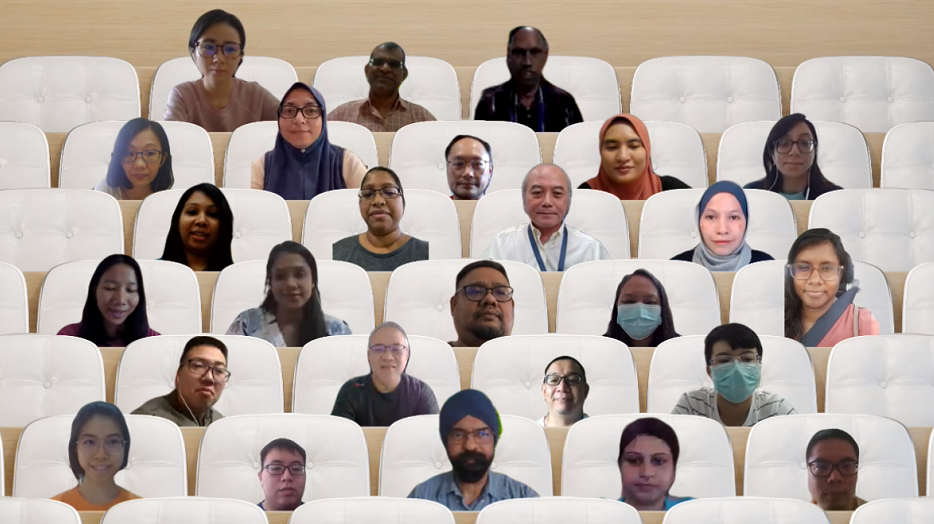
March 3, 2022, by Lisa Chin
The good, the bad and the ugly side of publishing
Our guest speaker series
From acclaimed academics to renowned industrial experts and leaders, we bring them to you through lectures, seminars, talks and a variety of other forums. They provide invaluable real-world insights into critical topic areas that are of interest to our postgraduate and research communities.
Introducing you to the world of publishing
For the inaugural session entitled The good, the bad and the ugly side of publishing: What counts and what does not, we invited Professor T. Ramayah who is currently a Professor of Technology Management at the School of Management, University of Science Malaysia (USM). It was held on Friday 25 February 2022 and attended by almost 80 of our academic staff and postgraduate students via MS Teams.
More information about Professor T. Ramayah can be found on the following sites:
Homepage: http://www.ramayah.com/
Google: https://scholar.google.com/citations?user=VzBIxYIAAAAJ&hl=en
SCOPUS: https://www.scopus.com/authid/detail.uri?authorId=8346805100
WOS: https://publons.com/researcher/648928/t-ramayah/
Journeying through publication
We often hear this famous aphorism, publish or perish. It speaks volumes about the importance of publishing, notably as an unequivocally key criterion for performance review and promotion evaluation in academia.
Calling himself as an accidental researcher, Professor T. Ramayah shared his academic journey on how he worked his way up to become a professor. His experience sharing illustrated the many challenges and demands that he had to overcome, offered insights into academic career progression and development.
Delving into publishing
Drawing on his substantial background and extensive experience of publishing more than 300 papers and serving on the editorial boards of several international journals, Professor T. Ramayah gave a comprehensive presentation which offered a walk-through of a range of topics covering the measures of academic research impact, types of publication, journal finders, publication processes and strategies as well as predatory publications. His presentation was interspersed with practical advice and realistic guidance, grounded in relevance.
“Consider all of the possibilities for publication from your research. These can be a theory paper, an integrated literature review, a qualitative or quantitative empirical article,” advised Professor T. Ramayah where he further demystified the elements and differences between them as well as the publishing models.
When talking about writing the paper, which is undoubtedly the most difficult part, Professor T. Ramayah emphasised the importance of developing good habits in writing. He also highlighted the importance of having a conducive environment that is ideal for your work. And when it comes to titling your paper, “Keep it short and sassy,” advised Professor T. Ramayah. Some interesting and engaging examples included: Elephant in the room; It’s the theory, stupid. He also shared some ideas for writing through literature, Google scholar alerts, colleagues and competitors and even from reviewing papers.
Other key highlights that were discussed and examined included building strategic networks, finding role models and mentors as well as how to target journals that are right for your research using a list of targeting questions. Professor T. Ramayah later shared how he creates his dream list and uses it to strategically target journals that fit his research work.
In term of submission strategy, “Don’t submit to all high level journals and at the end of the year, you have zero publication,” and in retrospect, “Don’t submit to all low level journals and then you get accepted but at the end of the year, you don’t get good publication,” advised Professor T. Ramayah.
“There is no way to get experience except through experience,” said Professor T. Ramayah when he delved into the topics of submitting and monitoring, handling revisions as well as responding to reviewers. “Don’t be confrontational. Don’t be discouraged,” advised Professor T. Ramayah.
Another important part after you get your paper published, which not many academics do, is post publication dissemination. “If you don’t disseminate your published paper, citation count wouldn’t go up,” said Professor T. Ramayah where he later explored the many ways you can consider for dissemination. He further discussed how you can monitor your performance and ranking through several platforms.
Last but not least, he encouraged the culture of sharing and helping each other. Publication is a journey thus do not treat it like a competition.
The session was later opened for Q&A where questions were posted and answered in real time.
A stimulating session and your wonderful responses
We received a substantial amount of appreciation messages from the participants. We hope that the session was able to instill in you the essentials of writing and publishing while also provide best practices, tips and tricks on how to publish effectively and consistently.
In publishing, persistence is the driver. With passion, perseverance and a little bit of luck, we wish you great success ahead!
Special thanks and acknowledgement: Professor T. Ramayah, School of Management, University of Science Malaysia (USM)
For those unable to attend, recording is accessible here.
For any enquiries or more information, please email to graduateschool@nottingham.edu.my.
-
Post a comment



